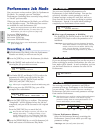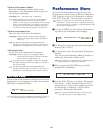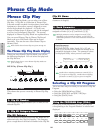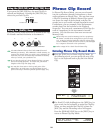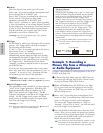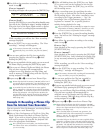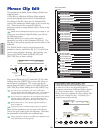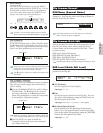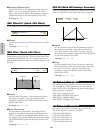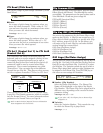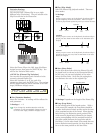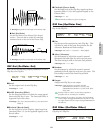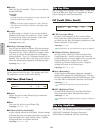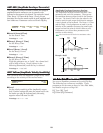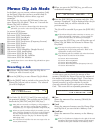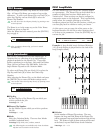
148
Phrase Clip Mode
■ ChoSend (Chorus Send)
Set the Send level of the signal sent from Insertion
Effect 1/2 (or the bypassed signal) to the Chorus
effect. You can also adjust this parameter using the
[CHORUS] knob on the front panel of the CS6x.
❏ Settings: 0 ~ 127
QED EffectCtrl (Quick Edit Effect)
Set the amount of Chorus applied to the entire Clip Kit.
■ Chorus
Set the Return level of the Chorus effect as an offset
value.
❏ Settings: -64 ~ 0 ~ +63
QED Filter (Quick Edit Filter)
These parameters control filters which control the
tonal quality of the Clip Kit. With the Low Pass Filter,
frequencies falling below the set Cutoff frequency are
passed, and frequencies above the Cutoff frequency are
blocked.
■ Cutoff
Set the Cutoff frequency. Only frequencies below
this point are passed. You can also adjust this
parameter using the [CUTOFF] knob on the front
panel of the CS6x.
❏ Settings: -64 ~ 0 ~ +63
■ Reso (Resonance)
Set the amount of Resonance (harmonic boost)
applied to the signal around the Cutoff frequency.
This is a useful way of adding further character to
the sound. You can also adjust this parameter using
the [RESONANCE] knob on the front panel of the
CS6x.
❏ Settings: -64 ~ 0 ~ +63
Range passed
Cutoff frequency Frequency
Cutoff range
QEDíFilter) Cutoff Reso
Common +63 +63
QEDíEffectControl) Chorus
Common +63
QED EG (Quick Edit Envelope Generator)
These two parameters control the change in the output
level of a Clip Kit over the time that a note is played.
■ Attack
Set the transition time from the moment a note on
the keyboard is pressed to the point at which the
level of the Phrase Clip reaches its peak. You can
also adjust this parameter using the [ATTACK] knob
on the front panel of the CS6x.
❏ Settings: -64 ~ 0 ~ +63
■ Decay
Set the transition time from the point at which the
level of the Phrase Clip reaches its peak to the point
at which it levels off. You can also adjust this
parameter using the [DECAY] knob on the front
panel of the CS6x.
❏ Settings: -64 ~ 0 ~ +63
Clip Common Arpeggio
The following four parameters control the behavior of
the Arpeggiator. These parameters are the same as
those used in Voice Edit Mode, and more details about
them are given on Page 82.
ARP Type (Arpeggio Type)
ARP Limit (Arpeggio Note Limit)
ARP Mode (Arpeggio Mode)
ARP PlayEF (Arpeggio Play Effect)
Clip Common Controller
You can set up to five Controllers for each Clip Kit.
The following five screens are available.
CTL Bend (Pitch Bend)
CTL Set1 (Control Set 1)
CTL Set2 (Control Set 2)
CTL Set3 (Control Set 3)
CTL Set4 (Control Set 4)
Attack
Level
Relese
Level
QEDíEG) Attack Decay
Common +63 +63



